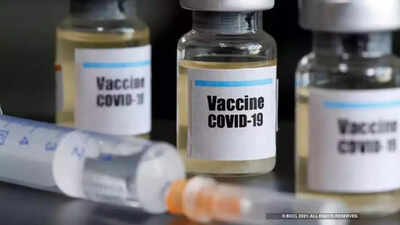Top Searches
- News
- City News
- kolkata News
- Bengal: ‘Mask up, intensify vax drive as Covid cases rise’
Bengal: ‘Mask up, intensify vax drive as Covid cases rise’

Representative image
KOLKATA: The Covid graph kept rising for the third consecutive day on Thursday, with Bengal logging 95 fresh cases in the past 24 hours. The positivity rate also climbed a bit, from 1% to 1.24% over four days. While health officials have started holding meetings early on to strategise measures so that the situation remains within control, Bengal’s Global Advisory Board (GAB) for Covid has suggested that the state should stress the use of masks in public and re-enforce the vaccination drive.
From 53 new cases on June 6, after a gap of over three weeks, the count rose to 61 the next day. On Wednesday, Bengal reported 85 cases and the count rose by another 10 in 24 hours. The rising rate does not look too alarming but health experts fear the upward trend might persist for now.
“The GAB has recommended to the state that certain measures need to be brought back, including stringent masking protocol. It has also recommended escalated vaccination drive to inoculate second-dose dropouts,” said hepatologist Abhijit Chowdhury, who is on the GAB.
The health department’s Covid expert committee has scheduled a meeting on Monday. “At the meeting, experts will provide inputs on countering the situation,” said IPGMER gastroenterology head G K Dhali, health department’s officer on special duty for Covid.
Certain labs pointed out the number of tests was still low but they had started getting positive results with high viral load. A 44-year-old, who had recently returned from the US, tested positive with low CT value, indicating high viral load. The hospital has sent this particular sample for genome sequencing.
“We have started testing patients in our OPD if they are found to have symptoms even if they come for treatment for other ailments. While we have found most reports negative, this exercise will ensure positive cases don’t escape detection,” said pulmonologist Kausik Chaudhuri, Covid nodal officer at state-run ID Hospital at Beliaghata.
“In addition to masking, especially in crowded places outside and indoors with poor ventilation, we should start increasing tests by targeting at least those with symptoms. Regular genome sequencing should be able to detect any kind of emerging new variant or mutant,” said microbiologist Bhaskar Narayan Chaudhuri of Peerless Hospital.
From 53 new cases on June 6, after a gap of over three weeks, the count rose to 61 the next day. On Wednesday, Bengal reported 85 cases and the count rose by another 10 in 24 hours. The rising rate does not look too alarming but health experts fear the upward trend might persist for now.
“The GAB has recommended to the state that certain measures need to be brought back, including stringent masking protocol. It has also recommended escalated vaccination drive to inoculate second-dose dropouts,” said hepatologist Abhijit Chowdhury, who is on the GAB.
The health department’s Covid expert committee has scheduled a meeting on Monday. “At the meeting, experts will provide inputs on countering the situation,” said IPGMER gastroenterology head G K Dhali, health department’s officer on special duty for Covid.
Certain labs pointed out the number of tests was still low but they had started getting positive results with high viral load. A 44-year-old, who had recently returned from the US, tested positive with low CT value, indicating high viral load. The hospital has sent this particular sample for genome sequencing.
“We have started testing patients in our OPD if they are found to have symptoms even if they come for treatment for other ailments. While we have found most reports negative, this exercise will ensure positive cases don’t escape detection,” said pulmonologist Kausik Chaudhuri, Covid nodal officer at state-run ID Hospital at Beliaghata.
“In addition to masking, especially in crowded places outside and indoors with poor ventilation, we should start increasing tests by targeting at least those with symptoms. Regular genome sequencing should be able to detect any kind of emerging new variant or mutant,” said microbiologist Bhaskar Narayan Chaudhuri of Peerless Hospital.
FOLLOW US ON SOCIAL MEDIA
FacebookTwitterInstagramKOO APPYOUTUBE
Looking for Something?

Start a Conversation
end of article










